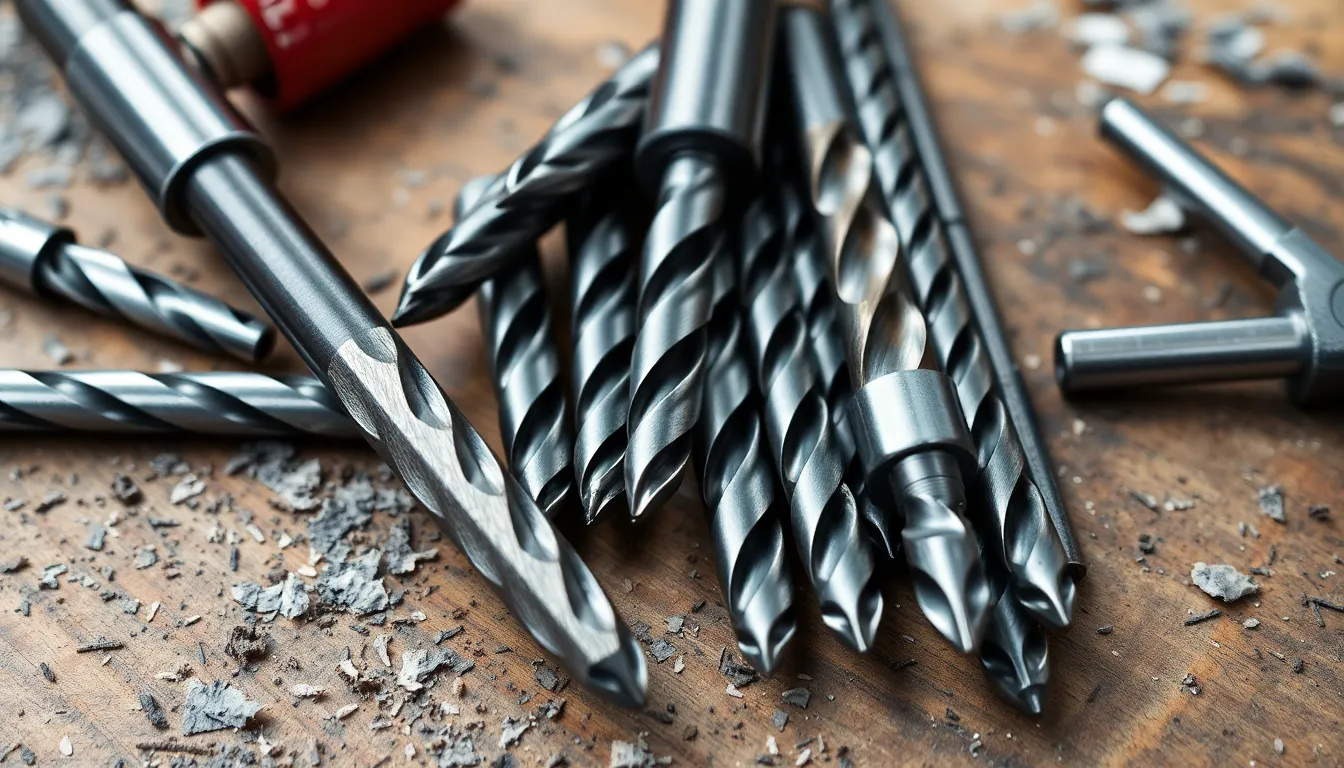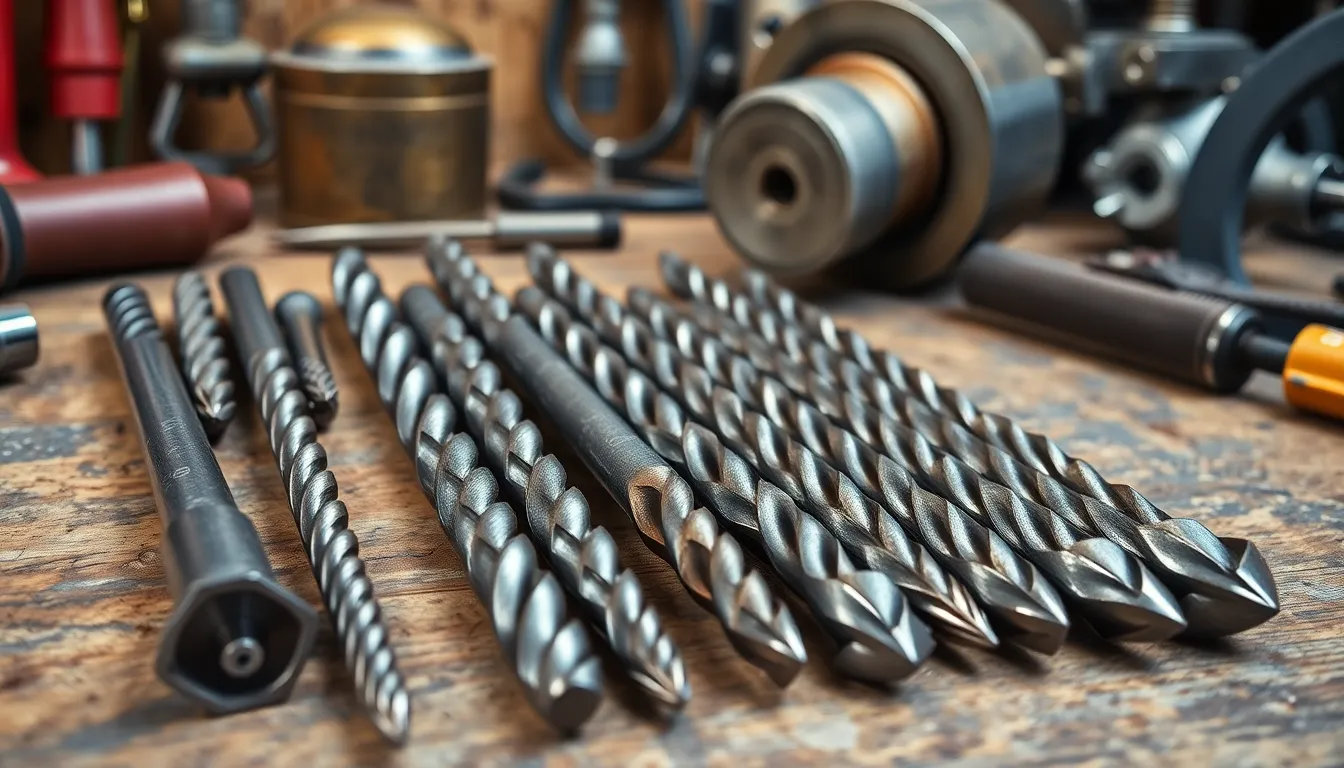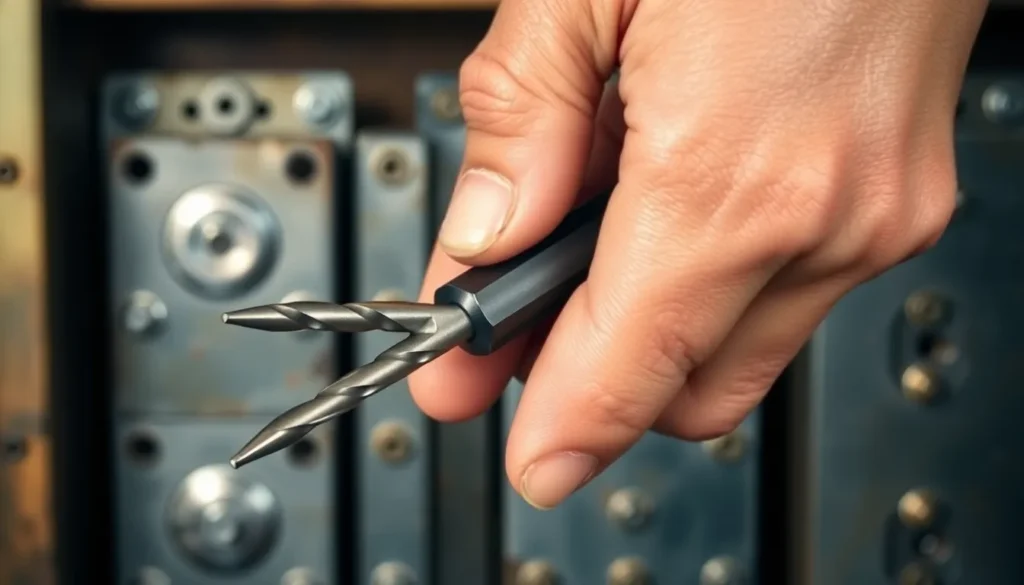When it comes to drilling through metal, choosing the right drill bit is like picking the perfect partner for a dance—get it wrong, and you’ll end up with a twisted mess. Metal can be tough, and not all drill bits are created equal. Some are designed to glide through like a hot knife through butter, while others might as well be trying to cut through a brick wall.
Table of Contents
ToggleOverview of Drill Bits for Metal
Drill bits specifically designed for metal feature unique characteristics that enhance their performance. Cobalt drill bits resist heat better than standard steel, making them ideal for harder metals. High-speed steel bits offer a versatile option, handling a range of metal types efficiently.
Titanium-coated bits provide enhanced durability. Their coating helps reduce friction and wear, allowing for longer tool life. Carbide-tipped bits excel in cutting through tough materials, providing another strong alternative for heavy-duty tasks.
Cutting edge geometry plays a critical role in drilling performance. Different angles and shapes affect speed and efficiency. A split point design often helps with improved penetration and accuracy, minimizing walking on harder surfaces.
It’s essential to match the drill bit type to the metal being worked on. For instance, aluminum requires bits with specific coatings to prevent clogging and ensure smooth operation. Stainless steel demands high-performance bits due to its hardness and tendency to dull tools quickly.
Proper lubrication enhances bit performance and prolongs life. Using cutting fluid or oil while drilling reduces heat buildup, resulting in cleaner holes and extended durability. Ensuring the right speed and pressure during operation also contributes significantly to achieving optimal results.
Understanding the specific applications of each drill bit type aids in making informed choices. Steel craftsmen leverage knowledge of these tools to maximize efficiency in their projects. Ultimately, selecting the right drill bit for metal leads to better performance and successful outcomes in metalworking endeavors.
Types of Drill Bits for Metal


Selecting the right drill bit for metal ensures efficient drilling and effective results. Several types of drill bits are specifically designed for various metalworking applications.
Cobalt Drill Bits
Cobalt drill bits contain a significant percentage of cobalt, enhancing their heat resistance. Tougher metals like stainless steel and titanium are easily processed using these bits. Durability is their key feature, providing longevity during challenging drilling tasks. Their stiffness minimizes the risk of breakage, making them ideal for industrial applications. Users appreciate cobalt drill bits for their ability to maintain sharp edges longer compared to standard bits.
High-Speed Steel (HSS) Drill Bits
High-speed steel (HSS) drill bits offer versatility across a range of metal types, making them a popular choice among craftsmen. These bits are known for their affordability and good performance in various metal materials. HSS bits maintain strength and effectiveness even at high temperatures, reducing the chances of damage. Their flexibility complements a variety of drilling tasks, allowing users to switch seamlessly between jobs. Many metalworkers favor HSS drill bits for general-purpose applications.
Carbide-Tipped Drill Bits
Carbide-tipped drill bits excel in cutting through tough materials due to their robust construction. The carbide tip provides increased hardness and heat resistance, ideal for heavy-duty metal applications. Users often find these bits provide faster drilling speeds while maintaining precision. Their ability to withstand wear makes them suitable for rigorous tasks and ensures a longer lifespan. Craftsmen rely on carbide-tipped bits when tackling difficult materials, resulting in superior performance.
Factors to Consider When Choosing a Drill Bit
Choosing the right drill bit for metal involves several key factors. These elements play a significant role in achieving the best performance during drilling.
Material and Durability
Material composition directly influences a drill bit’s durability. Cobalt drill bits possess exceptional heat resistance, making them suitable for hard metals like stainless steel and titanium. High-speed steel drill bits offer a balance of affordability and strength, making them versatile for different applications. Carbide-tipped bits excel at cutting through tough materials, providing extended life and reliability. Consideration of the materials used in manufacturing the bits helps ensure they withstand the demands of drilling tasks.
Size and Length
Size and length are essential when selecting drill bits. A proper size ensures compatibility with the drill chuck while achieving the desired hole diameter. Length matters as well; longer bits can reach deeper spaces, making them ideal for various projects, including those with added depth requirements. Standard sizes make it easier to obtain the right bit, ensuring consistent results. Selecting bits in appropriate lengths enhances access to difficult areas, minimizing effort and improving efficiency during operation.
Coating and Finish
Coating and finish enhance a drill bit’s cutting performance and longevity. Titanium coatings significantly reduce friction during drilling, increasing heat resistance and overall performance. Black oxide finishes add corrosion resistance, prolonging the life of steel drill bits while improving durability. Increased effectiveness stems from these coatings, providing enhanced performance when tackling tough metals. Evaluating the coating options ensures better results and maximized drill bit efficiency.
Top Recommendations for Best Drill Bit for Metal
Selecting the right drill bit for metal makes a significant difference in performance. The following recommendations include options that cater to various needs and preferences.
Product 1: Features and Benefits
Cobalt drill bits stand out for those working with hard metals. The heat resistance allows for prolonged use without wear, making it ideal for stainless steel applications. This type of drill bit maintains its sharpness longer than standard steel options, resulting in fewer replacements and enhanced efficiency. A 135-degree tip angle aids in accurate entry, reducing the likelihood of wander as drilling begins.
Product 2: Features and Benefits
High-speed steel (HSS) drill bits are versatile and affordable. Suitable for a range of metal types, these bits perform well in mild steel and aluminum. The flexibility of HSS drill bits allows them to handle varying drilling tasks effectively. Users appreciate the heat treatment process that strengthens the bits, helping them withstand wear while providing excellent cutting performance.
Product 3: Features and Benefits
Titanium-coated drill bits offer enhanced durability and cutting efficiency. The titanium coating reduces friction, allowing for smoother drilling in tough metals. Users notice an extended lifespan compared to standard steel bits, contributing to cost savings over time. This type of drill bit also works well at high speeds, making it suitable for both professional and DIY applications.
Choosing the right drill bit for metal is crucial for achieving optimal results in any metalworking project. By understanding the unique characteristics of cobalt, high-speed steel, and titanium-coated bits, craftsmen can select tools that enhance performance and durability.
Factors like cutting edge geometry and proper lubrication play significant roles in drilling efficiency and longevity. With the right bit, individuals can tackle various metal types with confidence, ensuring smooth operation and successful outcomes. Making informed decisions based on the specific requirements of each project will lead to better performance and satisfaction in metalworking endeavors.





